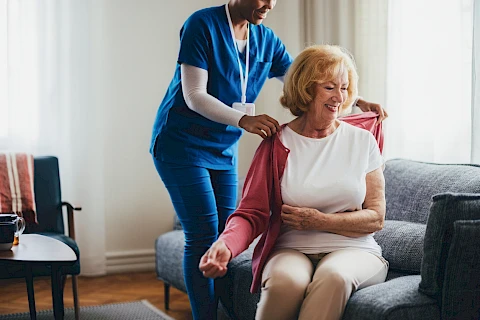
The weather can have an unexpected impact on joint pain. The aches and stiffness linked to weather changes, especially in rainy and colder seasons, can significantly affect daily activities and overall comfort. Addressing these challenges helps seniors maintain independence and a fulfilling lifestyle. We want to support caregivers in understanding and alleviating weather-related joint discomfort, ensuring seniors remain active and healthy.
What's the Connection?
Weather-related joint pain is often linked to changes in barometric pressure, which can cause joints to swell. This is why many people feel their pain worsening before it rains or when the temperature drops. Common symptoms include increased stiffness, swelling, and a throbbing sensation in affected joints. Seniors are particularly prone to these effects due to joint wear over time and conditions such as arthritis.
Tips for Pain Relief
Managing joint pain involves a combination of home remedies, dietary changes, and sometimes prescription medication. Here are some ways to help alleviate discomfort:
- Use warmth: Warm compresses or heating pads can improve circulation and ease stiffness.
- Choose anti-inflammatory foods: Include fish, nuts, and leafy greens to help reduce swelling and discomfort.
- Consider over-the-counter medication: NSAIDs, such as ibuprofen, may help manage pain. Follow package directions and consult a pharmacist or doctor if needed.
- Stay hydrated: Drinking water regularly supports joint lubrication and helps maintain flexibility.
Maintaining Mobility
Even with the challenges of weather-related joint pain, gentle daily movement supports flexibility and joint function. Gentle stretching routines help reduce stiffness, while low-impact activities like indoor walking or seated exercises keep joints active. Yoga and tai chi are joint-friendly options that also improve balance.
Supportive devices such as walkers or canes can reduce strain, but they should be fitted properly for safety. Encouraging regular movement—even brief periods throughout the day—can prevent stiffness from setting in.
When to Consult Healthcare Providers
While many joint pain issues can be managed at home, some signals indicate the need for professional advice. If joint pain becomes severe, persistent, or significantly limits daily activities, it's time to consult a healthcare provider. Look out for excessive swelling or sudden changes in joint alignment, which could indicate a more serious condition.
Before visiting the doctor, make a list of symptoms and any home treatments the senior has tried. This can help the healthcare provider assess the situation more accurately. Doctors may recommend additional treatment options such as physical therapy, prescription medications, or, in some cases, joint injections. These interventions can provide significant relief and improve mobility. Don't forget to ask their healthcare provider for the green light before your senior loved one begins any new exercise activities.
Need Joint Health Support?
Weather changes can impact joint pain, making it necessary for caregivers to understand and manage discomfort effectively. Following the tips outlined here can support a more comfortable lifestyle, but professional advice should be sought if pain worsens or does not improve. Reaching out for help when needed can make a meaningful difference.
Does your senior loved one need assistance with daily activities, healthy meal preparation, or medication management? For those in the North Vernon, Jeffersonville, Clarksville, Corydon, and Charlestown areas. Senior Helpers Southeastern Indiana is ready to provide personalized care solutions tailored to your needs. Contact us today!